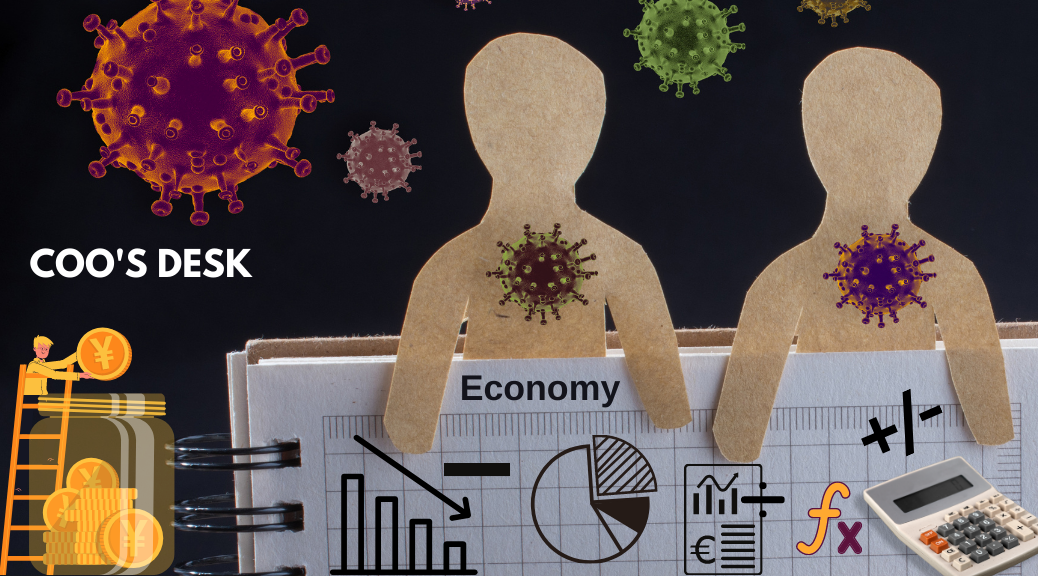How has Coronavirus impacted the Indian Economy


BY ASHIM SANYAL, COO CONSUMER VOICE
As I sit down to write, there are reports of more than 3.68 lakh fresh corona cases in India in the last 24 hours and 10 states account for 73.78% of the new cases registered. This is likely to slow down India’s economic recovery, but the overall impact will be milder in comparison to last year’s devastation. Experts say that the extent of economic loss during the second wave will primarily depend on how fast the chain of infections can be broken. Although most economists indicate that the impact of the second wave on the economy will not be as harsh as last year, there are several risks that can derail the economy. Some of them are rising income inequality, unemployment, sectoral impact, consumer confidence and inflation.
According to a research conducted by Hong Kong-based brokerage firm CLSA, the second wave of corona virus is likely to peak only in June. The prediction is based on an analysis of 12 countries including the US, Brazil, and the UK which faced a strong resurgence of Covid-19. CLSA found that the second waves in these countries peaked when incremental cases had hit the median of 2% of the population.
Local-level restrictions reasons for economic stress
Several indicators show that India’s economy is already feeling the stress of the ongoing deadly pandemic wave. While some of this impact is due to local-level restrictions that some state governments have imposed, others are because citizens are choosing to stay indoors. As per Apple’s driving index, which is compiled monthly on the basis of the number of requests made on Apple Maps for directions, Indians across major cities are commuting far lesser in April than in the previous three months.
The stress level even among the people who are not infected is on the rise. Everywhere there are daily health anxieties, deaths, increasing unemployment, isolation resulting in feelings of frustration and anger. While there is stress, people adopted various strategies to cope with the effects of the pandemic. In every market, consumers are the drivers of the market competitiveness, growth and economic integration. With economic instability, consumers are also experiencing a transformation in behaviour, though how much of transformation experienced during the crisis will sustain is a question. The most important factors which model the consumer’s behaviour in crisis are risk attitude and risk perception. Risk attitude reflects consumer’s interpretation concerning the risk content and how much he or she dislikes the content of that risk.
Online Shopping takes over the stage
In a matter of days there is a high level of dexterity and comfort in online shopping across the board. it is possible that people will reconsider venturing into public domains such as shopping malls and movie theatres with the same carefree and reckless gusto as before. Consumer behavior is influenced deeply by cultural factors. We are a social community with a high need for group activities – travel, tourism, shopping, religion, and entertainment. However Covid lockdowns have changed our mindsets and it’s a safety first approach. Also economists are worried that the cost due to the ongoing public health crisis can be one of the reasons behind the sharp rise in inflation shrinking the pockets of the consumers.
During the pandemic, people are spending less of their income on items perceived as nice-to-have or non-essential (such as clothing, shoes, make-up, jewellery, games and electronics). Globally too, during COVID-19, the developed nations are shifting towards steady state purchasing post-stock piling. Lower-income and younger consumers show a higher propensity to plan to reduce their spending, while older and higher-income groups exhibit more resilience.
The hospitality, tourism and entertainment sectors have been hit hard during the second wave. Pressure is mounting on other sectors like consumer durables, aviation and real estate as well. Most of these sectors have seen a reduction in business activity as consumer confidence has taken a knock due to the second wave. People are worried about their savings, jobs and health as the second wave rages on. Experts said that weak consumer confidence can hurt India’s economy as reluctance to spend on discretionary items could lower demand.
Evolving market for Consumers
The COVID -19 pandemic has fundamentally changed the world as we know it. People are living differently, buying differently and, in many ways, thinking differently. Supply chains have been tested . Retailers are closing doors. Consumers across the globe are looking at products and brands through a new lens. New habits formed now will endure beyond this crisis, permanently changing what we value; how and where we shop; and how we live and work. So consumers of all strata, across regions and states, beyond income levels are looking confused. The evolving market place is creating more puzzles than solutions as life and death are bigger priorities for consumers. Survive today for maybe a better tomorrow sees the consumers withdrawing their hands from their pocket. So practically, consumers are living a day to day life amidst chaos, confusion, hospitalization, deaths and hanging on the footboard with a sense of hapless feelings.
For other articles by Consumer VOICE COO’s Desk, click here
